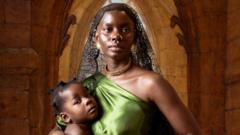In the depths of her postpartum struggle, Dola Posh, a Nigerian-British photographer, found herself questioning her identity just days after the birth of her daughter, Monioluwa. Isolated in an English hospital during the COVID-19 lockdown, Dola felt the pressure of expectations as family checked in from afar, pushing her mental state into a dark spiral. "I thought: ‘I’m me; the baby’s out, I’m still me.’ But no, I wasn’t me any more,” she recalled, unaware that her feelings were a symptom of postnatal depression, an issue disproportionately affecting black women.
As she readjusted to life outside the hospital, well-meaning acquaintances inundated her with unsolicited parenting advice, leaving her feeling inadequate and lost. Dola, who had previously carved out a niche in the fashion and celebrity photography scene in Lagos, now struggled against the mundane existence of new motherhood. One night, overwhelmed by exhaustion and isolation, she faced a heartbreaking moment when a voice urged her towards self-harm.
Amidst her turmoil, she found a lifeline in photography. Inspired by her cultural roots, she used self-portraiture to capture her struggles. Incorporating elements from her religious upbringing, including veils reminiscent of her past, she explored the profound and often painful reality of motherhood through her lens. The evolution of her work began to mirror her internal journey, illustrating moments of connection with Monioluwa while also confronting her own feelings of despair.
Dola's transformative path continued as she sought professional help. Therapy not only encouraged her to express her feelings but also allowed her to understand that motherhood came with its own complexities. As she began sharing her story publicly, the act of revealing her vulnerability fostered a sense of community and understanding around postnatal depression.
Awarded funding from Leica earlier this year, Dola now aims to amplify the voices of black mothers, empowering them to confront the burdens they bear. By depicting her journey through powerful imagery, she hopes to change narratives surrounding mental health, advocating for a world where no mother feels alone or ashamed in their experience. "I want a world where black mothers don’t have to carry so much burden and feel like they have to go through that journey alone," she asserts, embodying resilience and creativity in the face of adversity.
As she readjusted to life outside the hospital, well-meaning acquaintances inundated her with unsolicited parenting advice, leaving her feeling inadequate and lost. Dola, who had previously carved out a niche in the fashion and celebrity photography scene in Lagos, now struggled against the mundane existence of new motherhood. One night, overwhelmed by exhaustion and isolation, she faced a heartbreaking moment when a voice urged her towards self-harm.
Amidst her turmoil, she found a lifeline in photography. Inspired by her cultural roots, she used self-portraiture to capture her struggles. Incorporating elements from her religious upbringing, including veils reminiscent of her past, she explored the profound and often painful reality of motherhood through her lens. The evolution of her work began to mirror her internal journey, illustrating moments of connection with Monioluwa while also confronting her own feelings of despair.
Dola's transformative path continued as she sought professional help. Therapy not only encouraged her to express her feelings but also allowed her to understand that motherhood came with its own complexities. As she began sharing her story publicly, the act of revealing her vulnerability fostered a sense of community and understanding around postnatal depression.
Awarded funding from Leica earlier this year, Dola now aims to amplify the voices of black mothers, empowering them to confront the burdens they bear. By depicting her journey through powerful imagery, she hopes to change narratives surrounding mental health, advocating for a world where no mother feels alone or ashamed in their experience. "I want a world where black mothers don’t have to carry so much burden and feel like they have to go through that journey alone," she asserts, embodying resilience and creativity in the face of adversity.





















